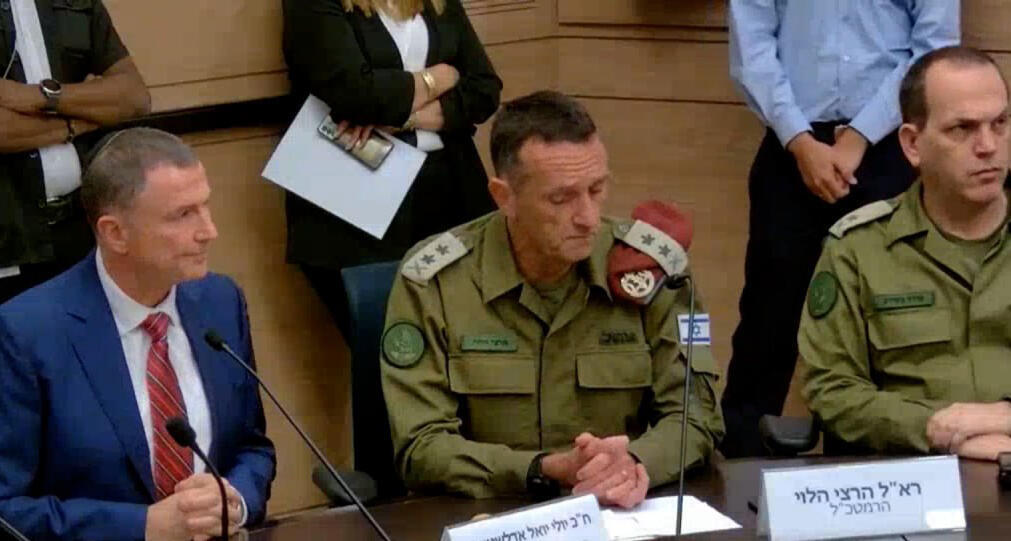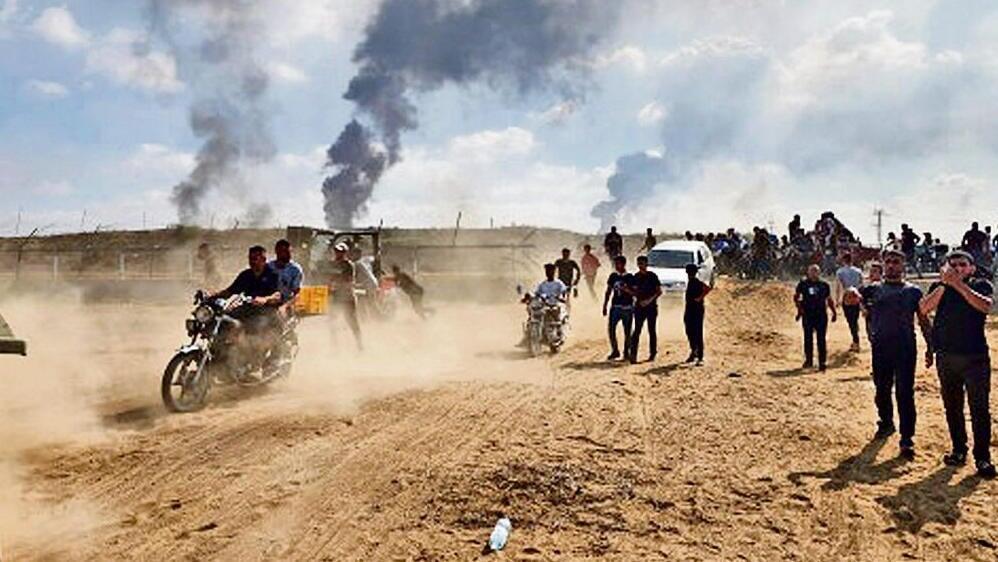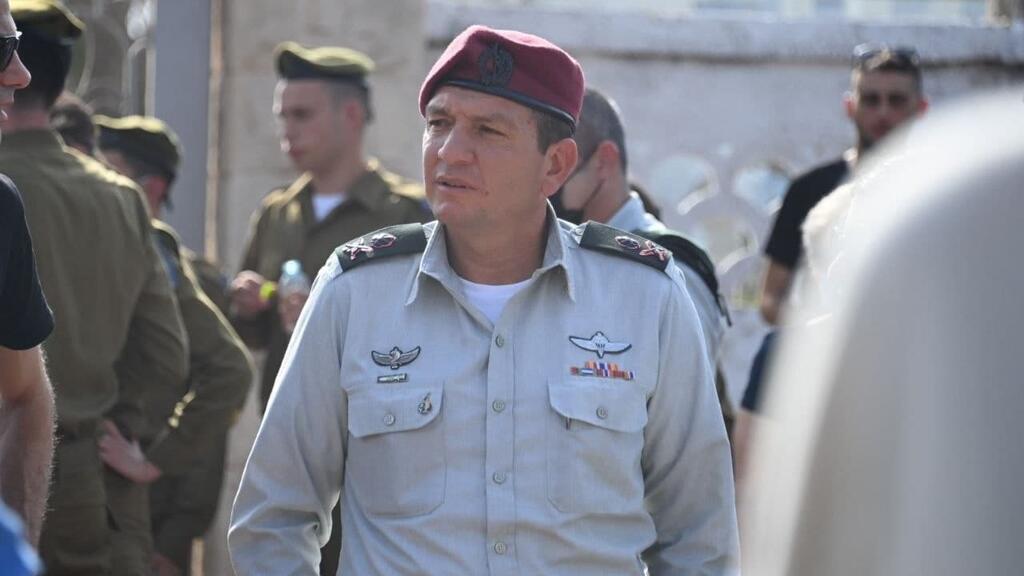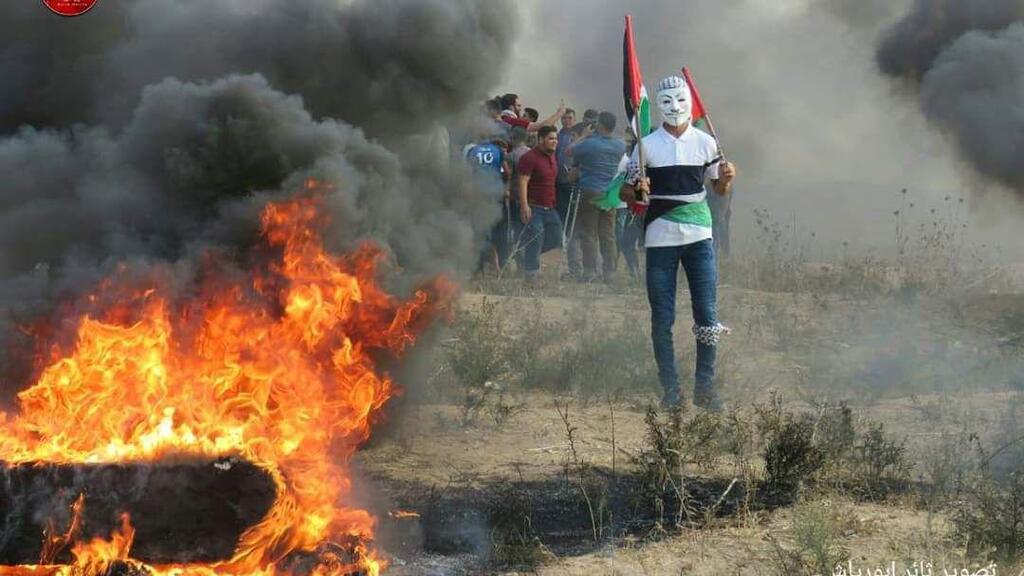While the turmoil in the intelligence directorate does not really wait until '6 p.m. After the War', Ynet and Yedioth Ahronoth are publishing a series of new details about the colossal failure that preceded October 7 which involved all levels, from the directorate's strategic perception of Hamas' intentions to failing to see Hamas' plans to carry out an unprecedented invasion of the surrounding settlements.
Read more:
Let's start with the fateful night between Friday and Saturday, the night of Simchat Torah. The Israeli security forces receive "weak signals" according to which something is happening on the border with Gaza.
The Chief of the Military Intelligence Directorate, Major General Aharon Haliva, is on vacation in Eilat with his family. At 3 A.M. his assistant calls to update him on information he had received from the intelligence officer of the Southern Command, according to which Hamas may be preparing for a proactive operation, but not in the scale of the massacre. Along with the indications there were also "reassuring signs", and it was agreed that if anything develops, Haliva should be updated.
However, at that time the top of the IDF officials decided to hold a consultation in a very senior forum, namely: Chief of Staff Lieutenant General Herzi Halevi, head of the Operations Directorate Major General Oded Basyuk, and Yaron Finkelman Major General of the Southern Command, who was also on vacation in the Golan Heights. Haliva was not involved. Neither was the head of the Research Division in Military Intelligence, Brigadier General Amit Sa'ar, an expert on the Gaza scene. As previously reported here, the Air Force commander, who has a key role in preparing for an attack of a certain magnitude, was not put on the line either.
How exactly can the top officials know what Hamas is thinking at that moment? How come the rule of thumb known to every novice was not applied here: whenever there is any doubt, there is no doubt? The answer given by the General Staff is that the warning was not reported as significant.
Although Finkelman and other officers were back, the general assessment was that this was another one of Hamas training exercise. Even the Shin Bet thought that it was nothing beyond a limited operation, and therefore they thought it was enough to call-up for the "Tequila" unit to the south, and no strict notice was issued. Even among the Shin Bet there were those who thought that sending the unit was an unnecessary step in view of the information. Three hours later the gates of hell opened on the settlements of the Western Negev.
Even in retrospect, the chief of military intelligence admits that based on the data presented to the Chief of Staff in that meeting, he would not have thought differently. The intelligence in this context flows from the bottom up, and the information that came from the bottom was nowhere near the dimensions of the actual invasion.
In retrospect, intelligence chief says evaluation of risk would be unchanged
Still, leaving the top intelligence out of the picture in real time, when the IDF and the Shin Bet are dealing with the issue, is a very serious failure, let alone the fact that the head of Aman has already been informed by his assistant that something was happening. This detail will also have to be clarified by the committee established to investigate the sequence of failures that led us to the reality we woke up to on the morning of Simchat Torah.
Needless to say, this issue needs to be fully clarified, alongside and regardless of addressing the root cause of the responsibility of the head of Aman and head of research division, who is an expert in the Palestinian arena with an emphasis on Gaza: he has previously served as the intelligence officer of the Southern Command, and as head of a branch of the Southern command, before he was appointed to serve in this critical position.
Behind the scenes of the high ranked command, even during the war, a tumult can be seen in view of various publications regarding the information that was accumulated in Aman about Hamas' intentions but was completely overlooked. One of the stories concerns a standing army officer, a woman named V., who was the only one to warn a senior intelligence officer about an invasion that would take place almost exactly as it happened. However, the serious accusation is that V's analysis reached Haliva, but he "dismissed" it. For many, this rang a familiar bell: they didn't listen to V, as they disdained the female observers.
However, it is important to mention: the entire top of the Intelligence Directorate, from Haliva, through the head of the Research Division Sa'ar, to the commander of 8200-Unit, claim that the document in question did not reach them. According to them, the issue will be clarified in the investigative committee and the claim that they hid a specific warning notice from the senior level is nothing less than a blood libel. The facts are that Haliva visited the unit three days prior to the war, in the middle of the Sukkot holiday. V. was not there. Another non-commissioned officer claims that he accompanied the general and said that he was troubled by a possible Hamas raid on the settlements and mentioned V.'s concern. No document reached the three senior officials of the Intelligence Directorate.
This does not mean that the severity of the exact things that V. wrote should be reduced. Last night Ilana Dayan (an Israeli investigative journalist and anchorwoman) published excerpt of V's paper, stating that "it involves a realistic scenario and golden information in preparation for a Hamas takeover operation in the south and a beheading." But a higher ranked officer dismissed her words and stated: "This is an imaginary and non-realistic scenario." The question of what the top officers knew - remains.
In this context, Ynet and its sister publication Yedioth Ahronoth publishes the summary of Haliva's visit to the unit, according to which the scenario raised by V. was not discussed there at all. On the contrary, it reads that: "Yahya Sinwar has no intention to lead to deterioration: Hamas ordered to restrain the area. Sinwar instructed to calm down."
Sinwar believed not to seek conflict
The direct commanding officer of this non-commissioned officer is a lieutenant colonel. Neither did she introduced the matter to 8200-unit commander. Haliva cannot "dismiss" an alert that was not introduced to him by anyone in the chain of command. The claim that such a warning can reach the head of Aman is also unfounded: there is no way that that such a documented warning would reach the head of Aman without going through other officers along the way. Nor did the issue of a concrete raid threat from Gaza came up during Haliva's visit in question. If this was the case, then emails would have turned into a warning from the bottom up.
In reality, and that's the tragedy, V's emails were blocked when reaching the level of the division and the Southern Command. A senior officer in the division says that V realized that the Hamas trainings had become concrete and hence their importance, but this was not yet a warning for war. A senior intelligence officer claimed that he did a thorough investigation of what was written there. The "warning" that Haliva allegedly "dismissed" is not considered a "warning" in intelligence terms, certainly not an onset of war.
All this, as mentioned, does not absolve the Intelligence Directorate in general and Haliva in particular, from the overall responsibility for the failure in the onset of the war. It is indisputable that the expected warning was not provided. Since the 2014 war against the Gaza factions, the IDF has detected Hamas preparations at various levels aiming to raid settlements in the Gaza envelope and IDF outposts in the Gaza Strip. However, as time passed, Hamas' training became more serious.
In the last year and a half, there's been a quantum leap that everyone who served in the Gaza strip or lived nearby noticed: when viewing from the Israeli side, binoculars were not needed to see the terrorists on the border. However, all the assessments in Aman were that this was a building of power and not an intention to carry out an operation. The difference is between what is known in the professional jargon as "intelligence of intentions" versus "intelligence of capabilities".
In fact, we are publishing for the first time that the head of the research division carried out a situation assessment ahead of the Tishrei holidays with the participation of the IDF, the Shin Bet and the Coordinator of Activities in the Territories, and there they all stated: "In our understanding, Sinwar has no interest in an extensive conflict." The concept was that Hamas is deterred and not interested in a proactive escalation, and the statements were acknowledged by the Mossad's control team, which is designed to examine such conclusions.
Still, in the Gaza Division, a preparation plan for a similar attack was drawn up about a year and a half ago and was even given a code name. This did not change the assessment of IDF intelligence nor the assessment of the Shin Bet, according to which Sinwar wants to govern and improve the economic situation in the Gaza Strip. This was the strategic error and the major oversight: "There is no military factor that has not been exposed to Hamas training," says a senior officer, "It came up in every intelligence document, but the entire top official was wrong in assessing his intentions." We have been paying for this mistake for 52 days and the end is not in sight.
Therefore, the original sin is not based only on the missing of V's emails, but on the illusion of conception. To show how strong and unusual it was, we are publishing today that in the annual assessment compiled by the Intelligence Division for 2024, before the war broke out of course, it was written: "The Palestinians will not be the motive for a multi-arena war." No less than that.
This does not absolve responsibility from the political level which should have been monitoring, verifying, and challenging, but as far as the security command is concerned, the bottom line is clear: the entire security command was unanimous. A senior officer at the General Staff says: "We all failed to understand that the plan hatching before our eyes became an order – we all failed - us, the Shin Bet, and the Mossad, which went over all the reports thoroughly, and even the assessment control teams. We don't know when Sinwar made the decision to turn it into an operational order, and we don't know why either, although speculations have been made".
4 View gallery


Chief of Staff Herzi Halevi (center) briefs Knesset FA&D comt. on dangers amid judicial legislation
(Photo: Knesset channel)
The turmoil that will ensue the General Staff following the war is also an opportunity to acknowledge that the manner in which nominations are made in the IDF is part of the problem. As has been written here repeatedly, Haliva has been serving for more than a decade in headquarters positions and has not served in field positions, such as regional command. In fact, he has not rubbed shoulders with the Arab enemy since he's been in the headquarters, he wears dress "Class-A" uniform since he was appointed head of the Operations Directorate, and then the head of the Technological and Logistics Directorate, and then the head of the operations division, and in the last year and a half he was put in charge of the sensitive intelligence directorate.
Even after Operation Breaking Dawn, he was proud of his assessment from the time he was in command of the operations division during Operation Guardian of the Walls: "I foresee five years of silence in the southern arena after the operation. In Gaza, alongside the exercise of power by Hamas, we see that the processes they are leading vis-a-vis Israel for economic stabilization and entrance of employees, have the potential to bring long-lasting peace."
There is no doubt that Haliva is tormented by the past. He will take off his uniform immediately after the war. The IDF should honestly ask how to prevent the conceptions from blinding the eyes of the wise in the present and in the future.




